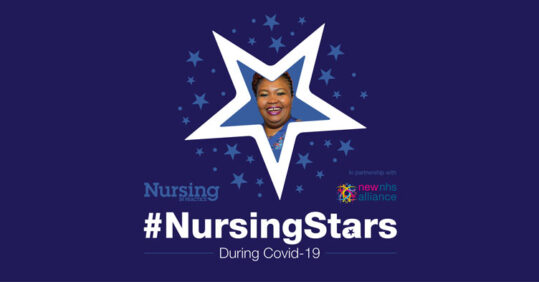Nursing Stars: Ruth Oshikanlu

We are profiling amazing practice and community nurses, and midwives, during the Covid-19 pandemic as part of our Nursing Stars campaign, partnering with the cross-sector movement New NHS Alliance. Here we speak to Ruth Oshikanlu.
What is your usual role?
I am an independent nurse entrepreneur, pregnancy mindset expert and parenting coach who supports women who have had assisted conception or previous pregnancy loss. I am a visiting lecturer at several universities and a trainer delivering training and coaching programmes to healthcare professionals and students. At the start of the pandemic, I returned to the frontline to work as an agency health visitor.
Related Article: MPs vote to legalise assisted dying in England and Wales
What work have you been doing during the Covid-19 outbreak?
Unfortunately, a few days after returning to frontline work in the community, I contracted Covid-19, infected my son with it and was unwell for six weeks. Whilst recuperating, I watched the media and saw many nurses that lost their lives to Covid-19 were black or Asian. It was great to see nurses and midwives being celebrated positively in the media. However, I felt that the reports were hospital-centric. The difference intensive care nurses make to those they care for is incredible. However, nurses and midwives care for those they serve everywhere they are based. In fact, the diversion of resources to hospitals at the start of the pandemic created problems for many nurses and midwives working outside hospitals.
Why would you say you are a Covid-19 Nursing Star?
I am a servant leader and was responsive to the different communities I serve. Many fertility clinics closed during the lockdown as the provision of fertility services was not deemed an essential service. This left many women and their partners very anxious as their fertility treatments were put on hold. Pregnant women and new mothers reported fear and anxiety around contracting Covid-19 from healthcare professionals they met. Many were stressed by the limited care choices available to them – for example, not having option of homebirths and not having their partners attend hospital. I launched VirtualMamahood, an online platform to support pregnant women and new mums reducing social isolation, providing them with a community and expert advice.
Many organisations provided their staff with psychological support whilst working during the pandemic. However, agency staff were often excluded from this provision. I had experienced this first-hand after contracting Covid-19. Upon recovery, I set up Carer’s Cafe, a daily online forum for nurses, midwives and health visitors who were feeling worried, anxious or stressed by the impact Covid-19 had had on them, offering them a safe way to connect, chat and find solutions.
Related Article: Super-regulator finds ‘weaknesses’ across NMC’s regulatory functions
I was successful in obtaining a Churchill Covid-19 Action Fund grant to provide frontline black, Asian and minority ethnic health and social care staff with culturally and spiritually sensitive psychological support.
What have you learnt from the experience of working during Covid-19?
My biggest achievement in 2020, the Year of The Nurse and Midwife was creating NursesAndMidwivesTalk. The platform showcases the wonderful contribution nurses and midwives make to people from before conception right to the grave, and how they have responded to the challenges of working through a global pandemic. To date, I have interviewed over 260 members of the nursing and midwifery family including: students, nursing associates, nurses, midwives, leaders and numerous legends who have left legacies for the profession. My greatest learning has been the diversity of the roles of nurses and midwives and how innovative we have been during the pandemic to continue to provide services that are patient/client focussed. I have also learned that we are best placed as nurses and midwives to tell our stories, if we are to inspire more people to join our professions.
How do you think Covid-19 will impact the way you work in the future?
Related Article: Could your nursing team be next to receive a General Practice Award?
Covid-19 has highlighted health inequalities that exist in society. Throughout my career, I have had a passion for reducing health inequalities and inequities and will continue to do so, progressing the work I undertook as part of my Churchill Fellowship in trauma-informed approaches to care. Despite the challenges of being locked down for several months, I have embraced digital technology to continue to support clients and also showcase the talents of my colleagues. I continue to develop confidence and plan to do more to challenge the inequalities that exist to continue to reduce these and improve outcomes for disadvantaged groups within society and within our profession.
My long-term goal is to create a trauma-informed system that fosters wellness and resilience for all health and care workers, as well as service recipients throughout the life course.

See how our symptom tool can help you make better sense of patient presentations
Click here to search a symptom




